|
|
|
Sort Order |
|
|
|
Items / Page
|
|
|
|
|
|
|
| Srl | Item |
| 1 |
ID:
132165
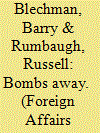

|
|
|
|
|
| Publication |
2014.
|
| Summary/Abstract |
In 1991, U.S. President George H. W. Bush decided to retire almost all the tactical nuclear weapons operated by the U.S. Army and the U.S. Navy. His reasons were simple: these short-range weapons were militarily useless and imposed significant burdens on the armed forces in terms of money, manpower, and time. Twenty-three years later, only one type of tactical nuclear weapon remains in the U.S. inventory: the B-61 gravity bomb. In addition to the several hundred B-61s located at home, the United States currently deploys around 180 of them in Europe, at bases in Belgium, Germany, Italy, the Netherlands, and Turkey. In the event of a nuclear conflict on the continent, NATO would deliver the bombs via U.S.-built F-15 or F-16 aircraft or European-built Tornado fighters, operated by some combination of Belgian, Dutch, German, Italian, and U.S. crews. Originally intended to prevent Soviet forces from penetrating Western Europe, the planes could travel as far east as Russia. But owing to their slower speed and lower altitude, they would be much more vulnerable to Russia's ground-based air defenses than would longer-range strategic bombers and missiles.
|
|
|
|
|
|
|
|
|
|
|
|
|
|
|
|
| 2 |
ID:
132128
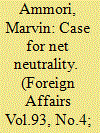

|
|
|
|
|
| Publication |
2014.
|
| Summary/Abstract |
For all the withering criticism leveled at the White House for its botched rollout of HealthCare.gov, that debacle is not the biggest technology-related failure of Barack Obama's presidency. That inauspicious distinction belongs to his administration's incompetence in another area: reneging on Obama's signature pledge to ensure "net neutrality," the straightforward but powerful idea that Internet service providers (ISPs) should treat all traffic that goes through their networks the same. Net neutrality holds that ISPs shouldn't offer preferential treatment to some websites over others or charge some companies arbitrary fees to reach users. By this logic, AT&T, for example, shouldn't be allowed to grant iTunes Radio a special "fast lane" for its data while forcing Spotify to make do with choppier service.
|
|
|
|
|
|
|
|
|
|
|
|
|
|
|
|
| 3 |
ID:
132148


|
|
|
|
|
| Publication |
2014.
|
| Summary/Abstract |
Over the past three years, the world has witnessed a surge of nonviolent resistance movements. Pictures of huge demonstrations in public squares have become a staple of international news broadcasts, and Time named "the protester" as its Person of the Year for 2011. These days, it seems that at any given moment, thousands of people are mobilizing for change somewhere in the world.
|
|
|
|
|
|
|
|
|
|
|
|
|
|
|
|
| 4 |
ID:
132162
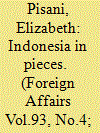

|
|
|
|
|
| Summary/Abstract |
In April, voters in Indonesia's parliamentary elections shocked many observers, confounded most pollsters, and seemed to set back their own long-term interests by failing to deliver a massive victory to the main opposition party, the Indonesian Democratic Party of Struggle. Under the country's complex electoral rules, a party must win 25 percent of the popular vote (or 20 percent of the seats in parliament) before it can formally nominate a presidential candidate. Polls had predicted that the Democratic Party of Struggle would win up to 30 percent of the vote, largely thanks to the massive popularity of the politician the party announced would represent it in the presidential election: Joko Widodo, the governor of Jakarta, who was expected to win that race handily. But his party managed to eke out only 19 percent -- more than any of the 11 other parties in the running, but not enough to cross the threshold. And so Jokowi, as he is widely known, will have to form a coalition to run for president, meaning that if he manages to take the helm of the world's third-largest democracy in July, he'll do so with little power and representing an alliance with no clear platform.
|
|
|
|
|
|
|
|
|
|
|
|
|
|
|
|
| 5 |
ID:
132152


|
|
|
|
|
| Publication |
2014.
|
| Summary/Abstract |
At their summit in California last June, U.S. President Barack Obama and Chinese President Xi Jinping committed themselves to building trust between their countries. Since then, new official forums for communication have been launched (such as the military-to-military dialogues recently announced by the two countries' defense ministers), complementing existing forums such as the Strategic and Economic Dialogue (which features the countries' top diplomats and economic officials). But despite these efforts, trust in both capitals -- and in the countries at large -- remains scarce, and the possibility of an accidental or even intentional conflict between the United States and China seems to be growing. Given the vast potential costs such a conflict would carry for both sides, figuring out how to keep it at bay is among the most important international challenges of the coming years and decades. The factors undermining trust are easy to state. East Asia's security and economic landscape is undergoing massive, tectonic change, driven primarily by China's remarkable economic rise in recent decades. That economic miracle, in turn, has made it possible for China to increase its military capacity and ramp up its political role in the region and beyond. China's leaders and prominent strategists have been at pains to insist that China's rise will be peaceful and poses no threat to its neighbors or the existing international political and economic order. But many members of the world community remain concerned and even skeptical, noting that history and international relations theory are replete with examples of conflict arising from clashes between a dominant and a rising power."
|
|
|
|
|
|
|
|
|
|
|
|
|
|
|
|
| 6 |
ID:
132164
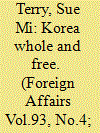

|
|
|
|
|
| Publication |
2014.
|
| Summary/Abstract |
When Kim Il Sung, North Korea's founding ruler, died in 1994, many outside observers predicted that his state would die with him. That never happened, of course, and his son Kim Jong Il managed to keep the regime alive until his own death, in 2011. When his son Kim Jong Un took the reins that year, numerous Korea watchers again predicted a collapse. Once again, they were proved wrong. Despite its extreme poverty, North Korea is still very much alive and a major threat to its southern neighbor.
|
|
|
|
|
|
|
|
|
|
|
|
|
|
|
|
| 7 |
ID:
132124
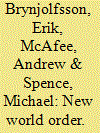

|
|
|
|
|
| Publication |
2014.
|
| Summary/Abstract |
Recent advances in technology have created an increasingly unified global marketplace for labor and capital. The ability of both to flow to their highest-value uses, regardless of their location, is equalizing their prices across the globe. In recent years, this broad factor-price equalization has benefited nations with abundant low-cost labor and those with access to cheap capital. Some have argued that the current era of rapid technological progress serves labor, and some have argued that it serves capital. What both camps have slighted is the fact that technology is not only integrating existing sources of labor and capital but also creating new ones.
|
|
|
|
|
|
|
|
|
|
|
|
|
|
|
|
| 8 |
ID:
132159


|
|
|
|
|
| Publication |
2014.
|
| Summary/Abstract |
The state is the most precious of human possessions," the economist Alfred Marshall remarked in 1919, toward the end of his life, "and no care can be too great to be spent on enabling it to do its work in the best way." For Marshall, one of the founders of modern economics and a mentor to John Maynard Keynes, this truth was self-evident. Marshall believed that the best way to solve the central paradox of capitalism -- the existence of poverty among plenty -- was to improve the quality of the state. And the best way to improve the quality of the state was to produce the best ideas. That is why Marshall read political theorists as well as economists, John Locke as well as Adam Smith, confident that studying politics might lead not only to a fuller understanding of the state but also to practical steps to improve governance.
|
|
|
|
|
|
|
|
|
|
|
|
|
|
|
|
| 9 |
ID:
132127
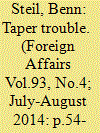

|
|
|
|
|
| Publication |
2014.
|
| Summary/Abstract |
In April 2013, Ukraine was sporting a massive current account deficit of eight percent, and it badly needed dollars to pay for vital imports. Yet on April 10, President Viktor Yanukovych's government rejected terms set by the International Monetary Fund (IMF) for a $15 billion financial assistance package, choosing instead to continue financing the gap between its domestic production and its much higher consumption by borrowing dollars privately from abroad. So a week later, Kiev issued a ten-year, $1.25 billion eurobond, which cash-flush foreign investors gobbled up at a 7.5 percent yield.
|
|
|
|
|
|
|
|
|
|
|
|
|
|
|
|
| 10 |
ID:
132161
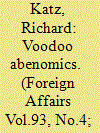

|
|
|
|
|
| Publication |
2014.
|
| Summary/Abstract |
Imagine the predicament currently facing a growing number of Japanese men in their early 30s. Despite having spent years cramming in high school and attending good colleges, many can't find a full-time job at a good company. Since Japan's rigid labor laws make it nearly impossible to lay off permanent employees in downtimes, companies now tend to fill open slots with part-time or temporary workers, and they typically pay them a third less. Today, 17 percent of Japanese men aged 25 to 34 hold such second-class jobs, up from four percent in 1988. Low-paid temps and part-timers now make up 38 percent of Japanese employees of all ages and both sexes -- a stunning figure for a society that once prided itself on equality.
|
|
|
|
|
|
|
|
|
|
|
|
|
|
|
|
| 11 |
ID:
132110
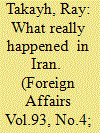

|
|
|
|
|
| Publication |
2014.
|
| Summary/Abstract |
Back in 2009, during his heavily promoted Cairo speech on American relations with the Muslim world, U.S. President Barack Obama noted, in passing, that "in the middle of the Cold War, the United States played a role in the overthrow of a democratically elected Iranian government." Obama was referring to the 1953 coup that toppled Iranian Prime Minister Mohammad Mosaddeq and consolidated the rule of the shah, Mohammad Reza Pahlavi. Obama would go on to remind his audience that Iran had also committed its share of misdeeds against Americans. But he clearly intended his allusion to Washington's role in the coup as a concession -- a public acknowledgment that the United States shared some of the blame for its long-simmering conflict with the Islamic Republic.
|
|
|
|
|
|
|
|
|
|
|
|
|
|
|
|
| 12 |
ID:
132118
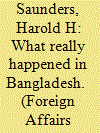

|
|
|
|
|
| Publication |
2014.
|
| Summary/Abstract |
On November 13, 1970, a devastating cyclone struck East Pakistan, a province dominated by the Bengali ethnic group and physically separated from the rest of Pakistan by India. The cyclone killed an estimated 230,000 people, and in its wake, the national government, based in West Pakistan, did too little to alleviate the suffering, further alienating the long-underrepresented Bengalis. A year later, they would declare independence. As an officer in the U.S. consulate in the East Pakistani capital of Dhaka later noted, "The cyclone was the real reason for the final break."
|
|
|
|
|
|
|
|
|
|
|
|
|
|
|
|
| 13 |
ID:
132114
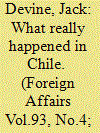

|
|
|
|
|
| Publication |
2014.
|
| Summary/Abstract |
On September 9, 1973, I was eating lunch at Da Carla, an Italian restaurant in Santiago, Chile, when a colleague joined my table and whispered in my ear: "Call home immediately; it's urgent." At the time, I was serving as a clandestine CIA officer. Chile was my first overseas assignment, and for an eager young spymaster, it was a plum job. Rumors of a military coup against the socialist Chilean president, Salvador Allende, had been swirling for months. There had already been one attempt. Allende's opponents were taking to the streets. Labor strikes and economic disarray made basic necessities difficult to find. Occasionally, bombs rocked the capital. The whole country seemed exhausted and tense. In other words, it was exactly the kind of place that every newly minted CIA operative wants to be.
|
|
|
|
|
|
|
|
|
|
|
|
|
|
|
|
| 14 |
ID:
132111
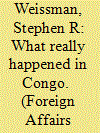

|
|
|
|
|
| Publication |
2014.
|
| Summary/Abstract |
It didn't take long for Congo's transition from Belgian colony to sovereign state to turn ugly. Both the Soviet Union and the United States were keeping a close eye on the mineral-rich country at the heart of Africa when, on June 30, 1960, it gained independence under a democratically elected government headed by Prime Minister Patrice Lumumba. A charismatic nationalist, Lumumba led the only party in parliament with a nationwide, rather than ethnic or regional, base. Within days, however, Congo's troops mutinied against their all-white officer corps (a holdover from the colonial era) and started terrorizing the European population. Belgium responded by sending forces to reoccupy the country and helping Congo's richest province, Katanga, secede. The United States, declining the appeals for help from the new Congolese government, instead threw its support behind a UN peacekeeping mission, which it hoped would obviate any Congolese requests for Soviet military assistance. But Lumumba quickly came into conflict with the UN for its failure to expel the Belgian troops and end Katanga's secession. After issuing a series of shifting ultimatums to the UN, he turned to Moscow for help, which responded by sending transport planes to fly Lumumba's troops into Katanga.
|
|
|
|
|
|
|
|
|
|
|
|
|
|
|
|
| 15 |
ID:
132134
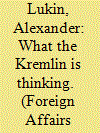

|
|
|
|
|
| Publication |
2014.
|
| Summary/Abstract |
Soon after the Soviet Union's collapse in 1991, Western leaders began to think of Russia as a partner. Although Washington and its friends in Europe never considered Moscow a true ally, they assumed that Russia shared their basic domestic and foreign policy goals and would gradually come to embrace Western-style democracy at home and liberal norms abroad. That road would be bumpy, of course. But Washington and Brussels attributed Moscow's distinctive politics to Russia's national peculiarities and lack of experience with democracy. And they blamed the disagreements that arose over the former Yugoslavia, Iraq, and Iran on the short time Russia had spent under Western influence. This line of reasoning characterized what could be termed the West's post-Soviet consensus view of Russia.
|
|
|
|
|
|
|
|
|
|
|
|
|
|
|
|
|
|
|
|
|